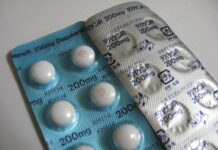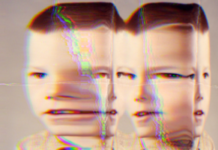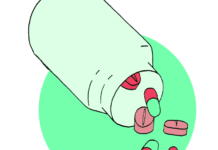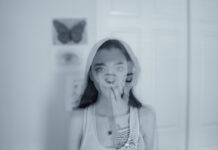Reflections on a Pathologized Adolescence and a Vision for the Future
My heart envisions a future of grassroots community-based, free, accessible, welcoming, non-judgmental and safe spaces for young people in the middle of the hurricane of adolescence....They will be spaces facilitated by those of us who’ve reclaimed what it means to be human.
New Report Points to Gaps in the Evidence for Pediatric Bipolar Disorder
A new report on pediatric bipolar critically examines the current evidence base and calls for more research before the diagnosis is used.
Antidepressants Associated with Increased Risk for Manic Symptoms
An analysis of medical records in the UK reveals that the use of certain antidepressants for depression is linked to a heightened risk for mania and bipolar disorder. The research, published this week in BMJ Open, found the strongest effect for serotonin reuptake inhibitors (SSRIs) and the antidepressant venlafaxine.
Anticonvulsant Implicated in Birth Defects in up to 4,100 Children, French Study Finds
Between 2,150 and 4,100 children suffered from severe malformations connected to valproate prescription.
Childhood Bipolar Disorder More Rare Than Previously Claimed, Study Finds
Re-examination of meta-analytic claims finds the prevalence of pediatric bipolar disorder is close to zero.
Experts Decry Dangerous Use of Antipsychotics in Children
In a featured article for Psychiatric Services, psychiatrists from Dartmouth raise the alarm on the increasing numbers of children prescribed dangerous antipsychotic drugs. Despite the fact that data on the safety of long-term use of these drugs in this vulnerable population “do not exist,” the rate of children and adolescents being prescribed antipsychotic drugs have continued to increase over the past fifteen years.
We Need to Talk About Frankie
In this piece for The Cut, Dyan Neary details the story of Frankie Perry, a man whose life was forever altered by being prescribed an...
Many Foster Kids Are Still Being Prescribed Antipsychotic Drugs
Many experts expressed concern when the rate of antipsychotic prescriptions to children in foster care showed a rapid increase, peaking in 2008, and new recommendations and policies have tried to curb the use of these drugs. While the rate has plateaued, a new study points out that the “new normal” prescription levels are still dangerously high. The data reveals that almost one in ten children in foster care are currently being prescribed antipsychotic drugs with dangerous side-effects, many for diagnoses like ‘ADHD’ and disruptive behavior.
Experts Stress Importance of Social Networks for Psychosis and Bipolar Interventions
Researchers develop a novel approach to mapping personal well-being networks for those diagnosed with severe mental illness (SMI) that incorporates social ties, connections to place, and meaningful activities.
Will Psychiatry’s Harmful Treatment of Our Children Bring About Its Eventual Demise?
The safety of our children is a sacred obligation we strive to preserve. Anything or anyone that harms them becomes the object of our...
Out-of-home Placements for Children Increase Odds of Psychiatric Issues
When controlling for social and family characteristics, separating children from parents into out-of-home care increases psychiatric issues, prescriptions, and criminal activity.
The Issue of Over-Diagnosing in Psychiatry
From The Concordian: On October 30th, Dr. Joel Paris, a professor of psychiatry at McGill University, gave a lecture about the dangers and consequences of...
Omega-3 Screening for Psychiatric Symptoms?
There is a substantial body of evidence suggesting that not getting enough omega-3 fatty acids in your diet may be connected to a diverse array of psychiatric symptoms. In a new study published this month, psychiatrist Robert McNamara and Erik Messamore provide an overview of the evidence and call for screening of omega-3 deficiency in people experiencing symptoms associated with ADHD, depression, mood disorders, and psychosis.
Researchers Call for Reappraisal of Adverse Mental Effects of Antipsychotics, NIDS
In a study published yesterday, researchers from the Nippon Medical School in Tokyo bring attention to a condition known as neuroleptic-induced deficit syndrome (NIDS)...
Disease Theory of ‘Mental Illness’ Tied To Pessimism About Recovery
Researchers recently completed a first of its kind, large-scale international survey of attitudes about mental health and they were surprised by the results. According to their analysis published in this month’s issue of the Journal of Affective Disorders, people in developed countries, like the United States, are more likely to assume that ‘mental illnesses’ are similar to physical illnesses and biological or genetic in origin, but they are also much less likely to think that individuals can overcome these challenges and recover
Neuroleptics for Children: Harvard’s Shame
Thirty years ago, the prescription of neuroleptic drugs to children under 14 years of age was almost unheard of. It was rare in adolescents, and even in adults was largely confined to individuals who had been given the label schizophrenic or bipolar. By 1993 about a quarter of 1% of the national childhood population were receiving antipsychotic prescriptions during office visits. The percentage for adolescents was about three quarters of 1%. By 2009, these figures had increased to 1.83% and 3.76% respectively. The devastating effects of these neurotoxic drugs are well known, and it is natural to wonder what forces might be driving this trend.
Book Review: “Overmedicated and Undertreated”
A former pharma executive has broken ranks with the industry in a new book by reporting how multiple psychiatrists, schools, and his desperate hopes pressed him to allow higher and higher doses of antipsychotic medications. The result: his 15-year-old son's death from Seroquel.
Bipolar? When Quitting is the Answer
Whether it’s the Nurtured Heart Approach, or any other method that’s truly up to the task, we need these effective strategies and ways of thinking to be more widespread so we can lessen the pitfalls of the medical model’s limited prospective which has no idea of how to turn intense into immensely great.
Study Explores Sexual and Intimate Partner Violence in College Women with Disabilities
A new study explores sexual violence and intimate partner violence in college women with mental health related disabilities.
“Is It Her Hormones?” A Case of Psychiatry Missing the Mark
The case of “Beth” depicts, almost innocently, the trials and tribulations of a well-adjusted, talented 15-year-old who developed depression, paranoia, panic attacks, and self-injurious and homicidal behavior, and “bipolar disorder” after being prescribed antidepressants, and then antipsychotics. After Beth decided - on her own - to discontinue psychotropic medications in favor of hormone therapy, she remained free of psychiatric symptoms.
Michael Samuel Bloom
by Chaya Grossberg
July 25, 2012
He also told me the shrinks were changing around his drugs and adding more. They added an antidepressant or two to the Lithium and increased doses and eventually he seemed to have very little life left in him. Our phone calls became trying for he was so down, practically dead sounding a lot of the time, and I felt unable to do anything or say anything to make a difference. To even try felt futile and I wondered if talking to me at all was becoming the burden of yet another person he couldn't connect with.
In the early years, he liked to think of us as being in the same boat, both mentally ill, since I'd also had a meltdown and I also am extremely sensitive and go through extreme states. But as the years went by, especially towards the end, I seemed to be in the ever growing “other” camp in his eyes, which meant I was yet another person who didn't get what it was like to be him. And at that point I can confirm I did not, and perhaps did not want to.
“Antipsychotic Use in Youth Without Psychosis: A Double-edged Sword”
This month’s issue of JAMA Psychiatry ran an editorial commenting on recent research revealing that the majority of youth prescribed antipsychotics have not been diagnosed with a mental disorder.
What Caused the American Child Bipolar Epidemic?
-Psychiatrists analyze why US bipolar diagnoses in children and adolescents increased 40 times over in less than 10 years.
Different Forms of Childhood Adversity Related to Specific Psychosis Symptoms
In this month’s issue of Psychological Medicine, researchers from King’s College London found evidence for associations between different types of childhood adversity and specific symptoms associated with psychosis. As current categorical approaches to psychosis and schizophrenia diagnoses come under increasing scrutiny, this study adds support to sociological and psychological theories and treatments.
Off-Label Antipsychotic Use Among Children Soaring
Researchers from Philadelphia and Baltimore find, in a study of Medicaid records for 50 states and the District of Columbia, that antipsychotic prescribing to...


















